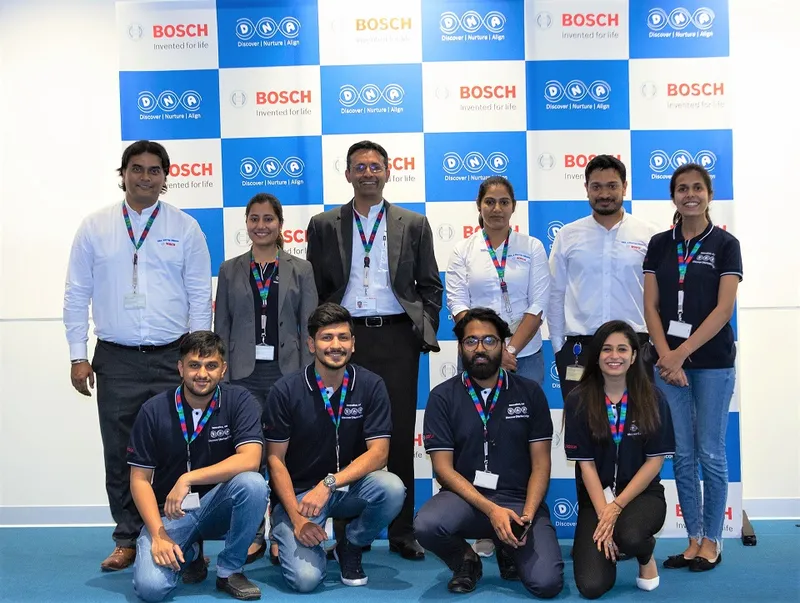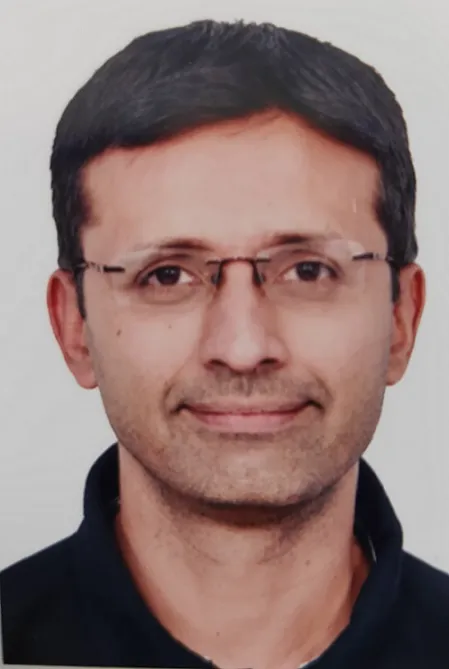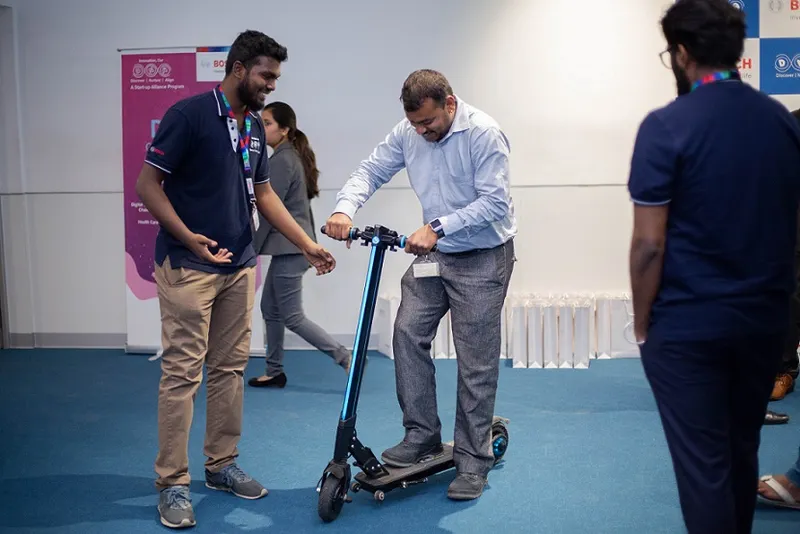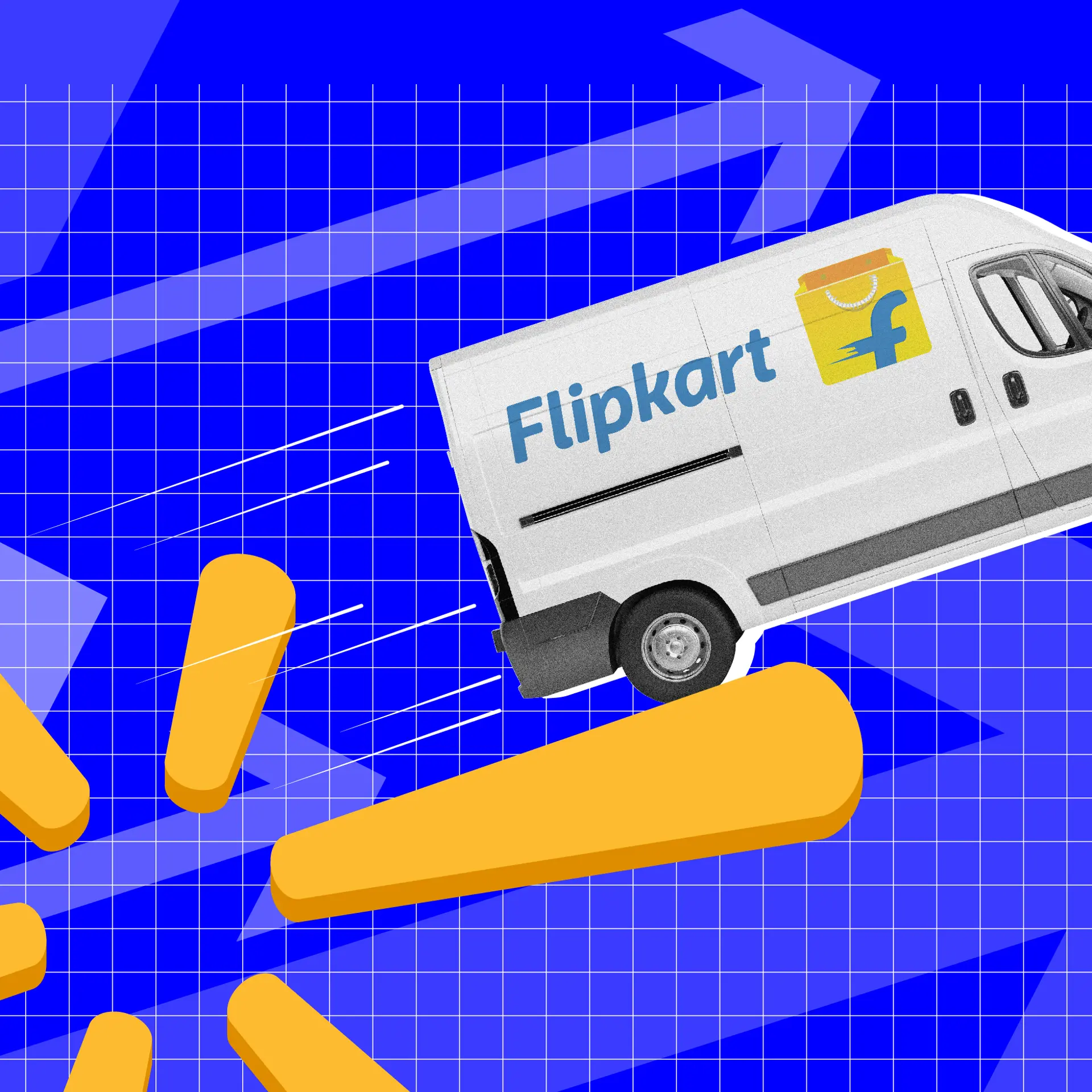Success through scale: how Bosch DNA accelerator helps startups with engineering tech solutions
Engineering tech giant Bosch is working on the third cohort of startups for its accelerator programme. Key opportunities for startups in this space are smart communities, e-mobility and Industry 4.0, as explained in this interview.
[This article is part of Startup Hatch, the YourStory series on incubators, accelerators, makerspaces, and coworking spaces in the startup ecosystem. See earlier profiles of initiatives at IIT Bombay, IIM Bangalore, BITS Pilani, NCL, Tata Elxsi, Axilor, NID, IIIT-Bangalore, IIIT-Hyderabad, Vellore Institute of Technology, PSG Coimbatore, Workbench Projects, Makers Asylum, NetApp Excellerator, TechStars, Indigram Labs, WeWork, Z Nation Lab, Sandbox Startups, Brigade REAP, Target India Accelerator, Maersk, Anthill Studio, UnternehmerTUM, AZO, EXIST, InsurTech Hub Munich, CoWorks Foundry, and Ashoka Innovators.]

Bosch DNA - Demo Day 3
The accelerator programme of German engineering technology giant Bosch is appropriately called DNA (Discover, Nurture, Align). The DNA Startup Alliance programme is headed by Debasis Goswami, whom YourStory partnered with for a series of smart city hackathons.
Aravind Raman is Head of Strategy and Business Development at Robert Bosch Engineering and Business Solutions, India. His responsibilities include startup engagement and co-creation, strategy development, and inorganic growth.
Aravind was earlier at HP, IBM, Infosys, and Hindustan Lever. He graduated from IIM Bangalore, Pondicherry University, and Annamalai University. In this chat, he tells us about the vision of the Bosch DNA accelerator, profiles of graduated startups, and emerging opportunities for founders from India.
Edited excerpts of the interview:
YourStory: What was the founding vision of your DNA accelerator programme, and how is it supported?
Aravind Raman: Our vision was to be the best in-class startup accelerator to nurture startups and co-create products and solutions to jointly address the market.
We have completed two cohorts and are working on the start of our third cohort. Success stories from DNA include AutoVRse, founded by Ashwin Jaishanker. It built a VR solution for Bosch dishwashers and is now an engineering service vendor for Bosch building VR solutions for multiple projects.
Ingo Electric, founded by Nikhil Gonsalves, is focussed on micro-mobility solutions. Sastra Robotics, founded by Aronin P, has developed an HMI (human-machine interface) testing robotic arm, which can mimic human action and reactions.

Panel Discussion - Corporate ecosystem support
YS: What would you say are the key opportunities for Indian entrepreneurs, and challenges that they face?
AR: Key opportunities are smart communities, e-mobility and Industry 4.0. Startups in India are good at developing a new solution for problems but they lack in finding the right use-case to work, commercialisation of the product, and sales and marketing networks. Bosch is working with startups to overcome these gaps by leveraging its in-house experts, labs and reach.
The unique challenges for social entrepreneurs would be to build scale, develop trust, and create a sustainable working model with stakeholders like the government on their side.
YS: What are the selection criteria for startups in your accelerator?
AR:
1. Firstly, startups should be working in any of Bosch’s focus areas and use cases.
2. Startups are selected based on the maturity of the solution, team, business model, and passion.
3. Startups are directly evaluated by business and topic owners of respective departments before getting selected for the Bosch accelerator programme.
YS: Who are some of your institutional partners?
AR: NASSCOM and GIZ are our partners. We also work with ecosystem players to enable scouting of the right startups
YS: What support and services do startups receive in your accelerator?

Aravind Raman
AR: Startups get access to our experts in defining the business model and value propositions. They can access our labs for mechanical fabrication, makerspace, software labs, smart city labs, and more.
Startup teams can connect to Bosch senior management, Bosch Germany counterparts, VCs, and investor networks. They have the possibility to work on a use-case with business units and the opportunity of getting business from Bosch.
Our startups are creating IPs in the technical side like algorithm and design. We don’t start with equity options during the cohort.
YS: How would you differentiate your accelerator from the other accelerators in the field?
AR: Bosch is a conglomerate and is active in automotive, building tech, energy and industrial sectors. Startups get a unique opportunity to work closely with different business units and test their products real-time in factories.
They can utilise the access to labs and makerspaces, and get mentored by Bosch in-house tech and business experts.
YS: What would you define as success for your accelerator?
AR: In the last cohort, we had 13 startups of which 10 have graduated and four are working closely with Bosch business units by exploring potential use-case and engagement models. For the second cohort, we intend to give selected startups an opportunity to align with business units and work closely to co-create the solution or go-to-market.
YS: How do you compare and contrast India's accelerators with those of other countries?
AR: Indian accelerators are still working on developing scale and creating success stories on a continuous basis. There is a shift towards focussing on themes and developing verticalised domain expertise.
YS: What are your plans for the next three to five years with respect to new startups?
AR: We would continue to work closely with startups with an emphasis on co-creating solutions and go-to-market approaches. We would like to build products and solutions along with these startups and add to our portfolio of Industry 4.0, IoT, smart community, automation, medtech and agritech.
YS: What are the challenges you face, and how can they be overcome?
AR: Our challenge is to develop innovation at scale and be a sustainable innovation engine for the organisation. We are working with partners in identifying the right startups who share our vision.

Ingo Electric
YS: How can better partnerships be forged between accelerators, industry and universities, and what can the government do in this regard?
AR: Players can develop a structured engagement mechanism, work on specific problem statements and create success stories. Policymakers should continue on the path towards creating a startup-friendly ecosystem in terms of policies, access to funds, and infrastructure
YS: What are your recommendations or words of inspiration to startups and entrepreneurs in our audience?
AR: Continue to work on your dreams and build non-linear and scalable businesses, which can create a sustainable impact.







